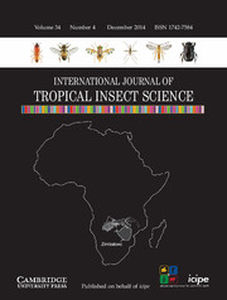Article contents
Improving olive fruit fly Bactrocera oleae (Diptera: Tephritidae) adult and larval artificial diets, microflora associated with the fly and evaluation of a transgenic olive fruit fly strain
Published online by Cambridge University Press: 13 October 2014
Abstract
Research on the olive fruit fly Bactrocera oleae (Rossi) – rearing simplification, insect microflora and transgenic strain evaluation – yielded several findings: (1) incorporation of antibiotics in the adult diet is evidently not needed; (2) colonization appears to be easier when wild adults are collected from the field instead of using mature larvae emerging from field-collected infested olives; (3) a combination of standard solid starter with liquid (no cellulose powder) finisher impregnated in synthetic sponge larval diets was more promising compared with all-liquid diets; (4) molecular analysis revealed extensive differences in bacterial species associated with the fly between laboratory flies and strains from different olive varieties, as well as between strains originating from different seasons of the year; (5) when an enhanced green fluorescent protein transgenic strain was compared with the standard long mass-reared strain, it proved significantly inferior according to all quality control tests applied, i.e. egg production, egg hatch, larval-stage duration, pupal recovery, pupal weight, adult emergence and adult survival. The aforementioned findings are discussed in the context of mass rearing and quality requirements for more successful implementation of the sterile insect technique against this pest.
Keywords
- Type
- Research Papers
- Information
- International Journal of Tropical Insect Science , Volume 34 , Issue S1 , November 2014 , pp. S114 - S122
- Copyright
- Copyright © ICIPE 2014
References
- 9
- Cited by


